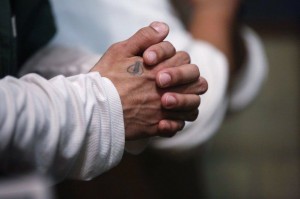U. S . Senator Cory Booker shared this on his Facebook page. I read it this morning and was profoundly moved. We gotta rethink mass incarceration people. The New Jersey Star-Ledger Editorial Board penned this thought provoking piece. I thought it was well worth sharing as we work to raise awareness, change hearts and minds and craft legislation to end these practices. ~ Babz Rawls Ivy.
By Star-Ledger Editorial Board
on December 07, 2014 at 8:03 AM, updated December 07, 2014 at 8:11 AM
Nothing good can come of throwing a prisoner into a cell the size of a bathroom, feeding him through a slot in the door and leaving him there until the walls start to talk.
Inmates shriek in the night, beat their foreheads bloody and kneel in puddles of their own urine. They begin to go mad. But the real damage doesn’t become apparent until they’re released. When you treat a man like an animal, don’t be surprised when he acts like one: Research shows solitary only makes people more violent and more likely to reoffend when they get out.
Yet we still have tens of thousands of prisoners in isolation, more than any other democratic nation. Prison officials claim that no one is subject to “solitary” in New Jersey, because inmates in so-called “administrative segregation” units are not single-bunked, they are celled in pairs. But as far as the psychological effects go, experts say there’s little difference.
Solitary, as defined by leading medical organizations and the United Nations, is being confined to a room for at least 22 hours a day alone or with one other person. The real harm comes from being locked away for so long. Not allowing prisoners out even for meals, counseling or a game of chess in a communal area can cause irreparable damage to their psyches, including bouts of paranoia and rage. They hallucinate, become chronically depressed and anxious, symptoms that last long past their time “in the box.”
Many had mental illnesses to begin with. Guards don’t just put the inmates they’re scared of in solitary — often, they throw in the ones they’re angry at, too. Some may be isolated for offenses as petty as scribbling on the wall or lying.
Instead, we should be banning solitary for juveniles except in the most extreme cases, as several other states have done, and greatly limiting its use for adults. Look at Mississippi: Because of escalating violence in its isolation units, prison officials took the unusual strategy of loosening their restrictions on solitary. The result? Almost no incidents of violence.
Legislators are pushing similar reforms here. Sen. Ray Lesniak (D-Union) introduced a bill that would virtually eliminate isolation for those who would suffer the most from it, including children, the elderly, inmates with mental illnesses and developmental disabilities. It would require an initial hearing within 72 hours of being placed in isolation, and a 15-day cap on time in the box, except in special circumstances. An inmate would also get a medical and mental health evaluation before being isolated, and be assessed by a clinician on a daily basis. Another pending bill, sponsored by Sen. Nellie Pou (D-Passaic), would also greatly restrict solitary for juveniles.
As the ACLU argues, we need to make solitary our punishment of last resort — used only to eliminate an immediate, serious threat. An inmate who has just shanked somebody and vowed to finish the job shouldn’t be sent right back to the general population. But as soon as he’s calmed and under control, remove him from solitary.
Because it’s not just cruel and unusual — it’s ineffective, and undermines public safety. Most prisoners will ultimately return to our streets. The question we need to ask ourselves is, do we want them to come back more damaged than when they went in?
Follow The Star-Ledger on Twitter @StarLedger and find us on Facebook.



